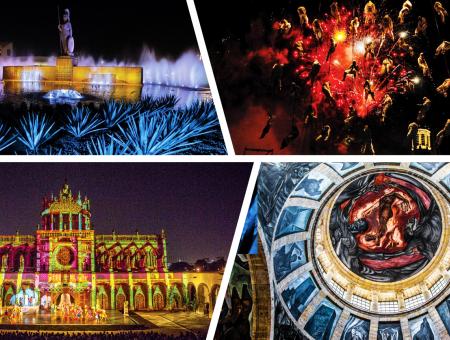 64 cities from 44 countries have been designated as UNESCO Creative Cities by Director-General, Irina Bokova. They join a Network at the frontline of UNESCO’s efforts to foster innovation and creativity as key drivers for a more sustainable and inclusive urban development. This network attracts growing interest from local authorities.
64 cities from 44 countries have been designated as UNESCO Creative Cities by Director-General, Irina Bokova. They join a Network at the frontline of UNESCO’s efforts to foster innovation and creativity as key drivers for a more sustainable and inclusive urban development. This network attracts growing interest from local authorities.
“These new designations showcase an enhanced diversity in city profiles and geographical balance, with 19 cities from countries not previously represented in the Network” declared the Director-General. She added “The cooperation framework proposed to foster candidate cities from the Africa region – a UNESCO Global Priority – has been a true success with 9 African cities now joining the Network.”
The new 64 UNESCO Creative Cities are:
Alba (Italy) – Gastronomy
Almaty (Kazakhstan) – Music
Amarante (Portugal) – Music
Auckland (New Zealand) – Music
Baguio City (Philippines) – Crafts and Folk Art
Barcelos (Portugal) – Crafts and Folk Art
Braga (Portugal) – Media Arts
Brasilia (Brazil) – Design
Bristol (United Kingdom of Great Britain and Northern Ireland) – Film
Brno (Czechia) – Music
Bucheon (Republic of Korea) – Literature
Buenaventura (Colombia) – Gastronomy
Cairo (Egypt) – Crafts and Folk Art
Cape Town (South Africa) – Design
Carrara (Italy) – Crafts and Folk Art
Changsha (China) – Media Arts
Chennai (India) – Music
Chiang Mai (Thailand) – Crafts and Folk Art
Chordeleg (Ecuador) – Crafts and Folk Art
Cochabamba (Bolivia [Plurinational State of]) – Gastronomy
Daegu Metropolitan City (Republic of Korea) – Music
Dubai (United Arab Emirates) – Design
Durban (South Africa) – Literature
Frutillar (Chile) – Music
Gabrovo (Bulgaria) – Crafts and Folk Art
[City of] Greater Geelong (Australia) – Design
Guadalajara (Mexico) – Media Arts
Hatay Metropolitan Municipality (Turkey) – Gastronomy
Istanbul (Turkey) – Design
João Pessoa (Brazil) – Crafts and Folk Art
Kansas City (United States of America) – Music
Kolding (Denmark) – Design
Kortrijk (Belgium) – Design
Košice (Slovakia) – Media Arts
Kütahya (Turkey) – Crafts and Folk Art
Lillehammer (Norway) – Literature
Limoges (France) – Crafts and Folk Art
Łódź (Poland) – Film
Macao Special Administrative Region, China (Associate Member, UNESCO) – Gastronomy
Madaba (Jordan) – Crafts and Folk Art
Manchester (United Kingdom of Great Britain and Northern Ireland) – Literature
Mexico City (Mexico) – Design
Milan (Italy) – Literature
Morelia (Mexico) – Music
Norrköping (Sweden) – Music
Ouagadougou (Burkina Faso) – Crafts and Folk Art
Panama City (Panama) – Gastronomy
Paraty (Brazil) – Gastronomy
Pesaro (Italy) – Music
Porto-Novo (Benin) – Crafts and Folk Art
Praia (Cabo Verde) – Music
Qingdao (China) – Film
Québec City (Canada) – Literature
San Antonio (United States of America) – Gastronomy
Seattle (United States of America) – Literature
Sheki (Azerbaijan) – Crafts and Folk Art
Sokodé (Togo) – Crafts and Folk Art
Terrassa (Spain) – Film
Tétouan (Morocco) – Crafts and Folk Art
Toronto (Canada) – Media Arts
Tunis (Tunisia) – Crafts and Folk Art
Utrecht (Netherlands) – Literature
Wuhan (China) – Design
Yamagata City (Japan) – Film
The UNESCO Creative Cities Network now counts a total of 180 cities in 72 countries.
While differing geographically, demographically or economically, all Creative Cities commit to develop and exchange innovative best practices to promote creative industries, strengthen participation in cultural life, and integrate culture into sustainable urban development policies.
Within the framework of the implementation of the United Nations 2030 Agenda for Sustainable Development and the New Urban Agenda, the Network provides a platform for cities to demonstrate culture’s role as an enabler for building sustainable cities.




